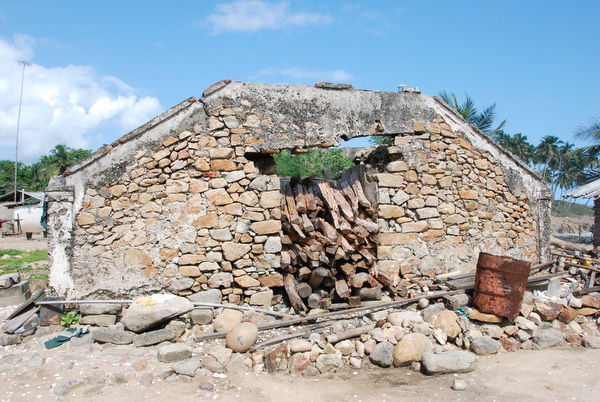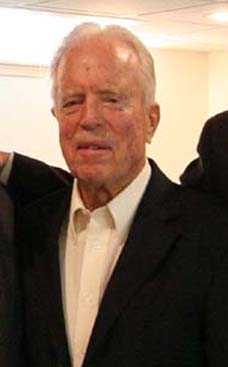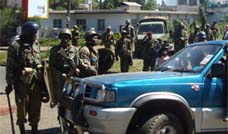
When the disillusioned Germans sailed home in 1717 they left Conny in charge of the fort, and he became an upstart native ruler on a Gold Coast dominated by forts of Swedes, Danes, Dutch, British and Portuguese. With 200 well-trained Nzema (pronounced EN-zah-ma) troops armed with good German guns, Conny proved more than up to the task. The English sailors on Atkins' ship found this out the hard way when they stopped at a watering hole near Cape Three Points not far from Prince's Town. Conny sent his emissary, carrying official credentials of "a large, gold-headed cane engraved John Conny," to demand the usual watering fee of 1 ounce of gold. The tars scorned the black official and refused to pay. The next day, Conny himself came to the watering hole with a posse of warriors, seized the British water casks, took a dozen sailors prisoner and knocked the head of a British officer who dared to object. The dispute ended with the Englishmen giving Conny 6 ounces of gold and a cask of brandy for the trouble they had caused him. Conny then invited them to dinner at his mansion in Prince's Town.
Ghana RPCV Frank Delano writes: John Conny remains a hero to residents in Prince's Town
John Conny remains a hero to residents in Prince's Town
Native chief faced down the British and the Dutch during Prince's Town's Golden Age.
Date published: 9/1/2007
Caption: One wall of John Conny's house remains at Prince's Town.
BY FRANK DELANO
PRINCE'S TOWN, Ghana--John Atkins, a doctor on a British warship, visited Prince's Town by accident in 1721. Little did Atkins know that he had stumbled upon John Conny, the town's most revered hero from the brief Golden Age of its history.
Conny (ca. 1670-ca. 1725) was the chief of Prince's Town. Atkins described him as "a strong-made man, about fifty, of a sullen look," "a bold and subtle fellow" and "cheerful and familiar" at the dinner table.
Atkins said Conny "seemed to have several" wives. One of them, "big with child," sat behind Conny at the table. Atkins estimated the two of them wore 8 or 10 pounds of "gold chains about their necks, their wrists, ankles and legs [and] drops in their hair."
The table was set with knives, forks and jugs of brandy in the fashion of the Brandenburgers, who had built Fort Gross-Friedrichsburg at Prince's Town in 1683. Conny had been their agent to buy gold, ivory and slaves from the interior of the country.
When the disillusioned Germans sailed home in 1717 they left Conny in charge of the fort, and he became an upstart native ruler on a Gold Coast dominated by forts of Swedes, Danes, Dutch, British and Portuguese.
With 200 well-trained Nzema (pronounced EN-zah-ma) troops armed with good German guns, Conny proved more than up to the task. The English sailors on Atkins' ship found this out the hard way when they stopped at a watering hole near Cape Three Points not far from Prince's Town.
Conny sent his emissary, carrying official credentials of "a large, gold-headed cane engraved John Conny," to demand the usual watering fee of 1 ounce of gold.
The tars scorned the black official and refused to pay.
The next day, Conny himself came to the watering hole with a posse of warriors, seized the British water casks, took a dozen sailors prisoner and knocked the head of a British officer who dared to object.
The dispute ended with the Englishmen giving Conny 6 ounces of gold and a cask of brandy for the trouble they had caused him. Conny then invited them to dinner at his mansion in Prince's Town.
"His town [is] as neatly raftered and built as most of our north or west small country villages. Every man has coco[nut] trees round the house and in the streets (such as they are) sit people to sell the nuts, limes, soap, [and] Indian corn," wrote Atkins.
Defeating the Dutch
The main topic of conversation at Conny's table was his victory over the Dutch in 1720.
The Dutch had shown up in three warships. They said they had bought Fort Gross-Friedrichsburg from the Brandenburgers. They demanded that Conny turn it over.
Conny asked to see a deed or other proof of the sale, which the Dutch could not provide. Conny further told the Dutch that, even if the Europeans had bought the fort's cannon, brick and stone, they hadn't bought the land on which it sat.
"The ground was not [the Germans'] to dispose of. They have paid me rent for it. I do not design to tenant it out to any other white men while I live," Conny told the Dutch.
Angered, the Dutch opened fire on the fort and landed many men. Conny's well-trained and well-armed men hid among the buildings and bushes of the town and ambushed the Dutch.
Fifty-six Dutchmen died in the battle. Conny's men cut off the heads of the Dutchmen and placed them on the steps of the fort.
"I ventured to ask him what had become of the Dutchmen's skulls," Atkins wrote in his 1735 memoir "A Voyage to Guinea."
"He told me very frankly, that about a month before our ship's arrival, he had put them all into a chest with some brandy, pipes and tobacco, and buried them," Atkins reported.
Conny told Atkins it was time "that all malice should depart." He said putting the things the Dutchmen loved in the casket with their skulls was "our way of respecting the deceased."
Conny's Fall
The Dutch returned in 1724, drove Conny and his men out of Prince's Town and captured the fort. They renamed it Hollandia. They kept it until 1872, when they turned it over to the British.
A year or two after his expulsion from Prince's Town, Conny returned with his troops in an unsuccessful attempt to recapture the fort and the town. He was captured by the Dutch and, according to Prince's Town legend, sold as a slave in the Caribbean.
There, his name became John Canoe. It lives on in the flamboyant Junkanoo festivals held around Christmas in the Bahamas, Jamaica and other Caribbean islands.
One wall of John Conny's house still stands in Prince's Town. The people of Prince's Town still revere Conny and hate the memory of the Dutch.
Older residents of Prince's Town remember when a human jawbone, reportedly Dutch, hung in a big tree in the middle of the compound of the Chief's Palace near Conny's house. The tree and the jawbone are now both gone.
"The Dutch really punished the people of Prince's Town. The only good thing they left us was the pineapple," said a Prince's Town resident.
"Our kingdom was a unique kingdom, but it was taken away with John Conny. We have to hail the man because he was a hero," he said.
Oddly, an unusual, pink-budding pineapple grows only in Prince's Town. The people call the sweet and delicious fruit "John Conny."









